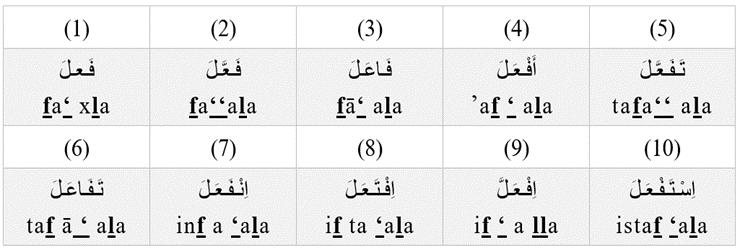A verbal noun in Arabic can be equivalent to the gerund or infinitive in English. In Arabic, it is called the مَـصْـدَر (maṣdar), meaning ‘source.’
We have learned that derived forms take the triliteral abstract verb and add to it prefixes, suffixes, and infixes. The ten most common verb patterns in the past tense are:

Verbal Nouns of Pattern (1)
Verbs of Pattern (1) are generally considered unpredictable and require memorization and practice to identify their corresponding verbal nouns.
Here are some examples of verbal nouns in Arabic derived from simple triliteral past verbs, i.e., Pattern (1):
| أَكَـلَ ’akala he ate | أَكْـل ’akl eating | شَـرِبَ shariba he drank | شُـرْب shurb drinking |
| جَـلَـسَ jalasa he sat | جُـلـوس julūs sitting | عَـرَفَ ‘arafa he knew | مَـعْـرِفَـة ma‘rifah knowing or knowledge |
| سَـمِـعَ sami‘a he heard | سَـمـاع samā‘ hearing | ذَهَـبَ dhahaba he went | ذَهـاب dhahāb going |
| كَـتَـبَ kataba he wrote | كِـتـابَـة kitābah writing | سَـبَـحَ sabaḥa he swam | سِـبـاحَـة sibāḥah swimming |
| فَــهِــمَ fahima he understood | فَـهْـم fahm understanding | قَـتَـلَ qatala he killed | قَـتْـل qatl killing |
Verbal Nouns of Other Patterns in Arabic
The verbal nouns of the other patterns are as follows:

Here are examples of the most common forms of verbal nouns in Arabic:
| Verb | Pattern | Verbal Nouns |
| عَـقَّـدَ (‘aqqada) he complicated | (2) | تَـعْـقـيـد (ta‘qīd) complicating |
| وَظَّـفَ (waẓẓafa) he employed | (2) | تَـوْظـيـف (tawẓīf) employing |
| جَـرَّبَ (jarraba) he experimented | (2) | تَـجْـرِبَـة (tajribah) experiment |
| بَـرَّأَ (barra’a) he acquitted | (2) | تَـبْـرِئَـة (tabri’ah) acquittal |
| عـاقَـبَ (‘āqaba) he punished | (3) | عِـقـاب (‘iqāb) or مُـعـاقَـبَـة (mu‘āqabah) punishment |
| جـاهَـدَ (jāhada) he struggled | (3) | جِـهـاد (jihād) struggle |
| بـارَكَ (bāraka) he blessed | (3) | مُـبـارَكَـة (mubārakah) blessing |
| أَكْـمَـلَ (’akmala) he completed | (4) | إِكْـمـال (’ikmāl) completion |
| أَعْـجَـبَ (’a‘jaba) he impressed | (4) | إِعْـجـاب (’i‘jāb) admiration |
| تَـخَـيَّـلَ (takhayyala) he imagined | (5) | تَـخَـيُّـل (takhayyul) imagining |
| تَـوَقَّـعَ (tawaqqa‘a) he expected | (5) | تَـوَقُّـع (tawaqqu‘) expectation |
| تَـقـاسَمَ (taqāsama) he partitioned | (6) | تَـقـاسُـم (taqāsum) partitioning |
| تَـبـادَلَ (tabādala) he exchanged | (6) | تَـبـادُل (tabādul) exchange |
| اِنْـطَـلَـقَ (inṭalaqa) he set off | (7) | اِنْـطِـلاق (inṭilāq) setting off |
| اِنْـحَـدَرَ (inḥadara) he declined | (7) | اِنْـحِـدار (inḥidār) decline |
| اِنْـتَـخَـبَ (intakhaba) he elected | (8) | اِنْـتِـخـاب (intikhāb) electing |
| اِجْـتَـمَـعَ (ijtama‘a) he gathered | (8) | اِجْـتِـمـاع (ijtimā‘) meeting |
| اِحْـمَـرَّ (iḥmarra) it became red | (9) | اِحْـمِـرار (iḥmirār) turning red |
| اِسْوَدَّ (iswadda) it became black | (9) | اِسْـوِداد (iswidād) blackening |
| اِسْـتَـقْـبَـلَ (istaqbala) he received | (10) | اِسْـتِـقْـبـال (istiqbāl) receiving |
| اِسْـتَـأْجَـرَ (ista’jara) he rented | (10) | اِسْـتِـئْـجـار (isti’jār) renting |
أَنْ (’an) ‘that’ + Subjunctive = Verbal Noun
As an alternative to the verbal noun, one can use the particle أَنْ (’an) ‘that,’ followed by the present verb in the subjunctive mood. The verb is conjugated according to the gender and number of the subject. Here are some examples:
| أُريـدُ زِيـارَةَ عـائِـلَـتـي٠ ’urīdu ziyārata ‘ā’ilatī. I want to visit my family. | أُريـدُ أَنْ أَزورَ عـائِـلَـتـي٠ ’urīdu ’an ’azūra ‘ā’ilatī. I want to visit my family. |
| أَجـابَ قَـبْـلَ دِراسَـةِ الْـمَـوْضـوع٠ ’ajāba qabla dirāsati -l-mawḍū‘. He answered before studying the topic. | أَجـابَ قَـبْـلَ أَنْ يَـدْرُسَ الْـمَـوْضـوع٠ ’ajāba qabla ’an yadrusa -l-mawḍū‘. He answered before studying the topic. |
| نَـرْجـو إِكْـمـالَ الـدَّرْسِ٠ narjū ’ikmāla -d-dars. We hope to complete the lesson. | نَـرْجـو أَنْ نُـكْـمِـلَ الـدَّرْسَ٠ narjū ’an nukmila -d-dars. We hope to complete the lesson. |
| أَرادوا الـذَّهـابَ إِلـى الْـبَـيْـت٠ ’arādū –dh–dhahāba ’ilā -l-bayt. They wanted to go home. | أَرادوا أَنْ يَـذْهَـبـوا إِلـى الْـبَـيْـت٠ ’arādū ’an yadh habū ’ilā -l-bayt. They wanted to go home. |
Other lessons in Level V:









